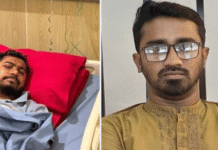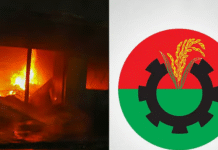The police are keeping Jatiya Party leader Syed Mohammad Kaiser, a war crimes suspect, under surveillance at the Apollo Hospital in the city. “Law enforcers have been keeping a close watch on Kaiser since Thursday night. They won’t let the suspect evade his trial at the International Crimes Tribunal (ICT) over his involvement in crimes against humanity during the Liberation War. Kaiser is undergoing treatment at the coronary care unit (CCU) of the hospital,” Syed Zia-uz-Zaman, officer in-charge (OC) of Vatara police station, said on Friday. “This will continue till the hospital authorities declare him fit and release him from the CCU.” he added.
According to sources, Kaiser was arrested from the Vatara area on Thursday. After his arrest, the Jatiya Party leader complained of severe chest pain and was taken to the hospital.
On May 15, the ICT-2 had issued an arrest warrant against Kaiser over allegations of crimes against humanity during the 1971 Liberation War. The three-member tribunal, headed by its chairman, Justice Obaidul Hassan, passed the order. The tribunal had directed law enforcement agencies to execute the order as early as possible and produce the accused before it within 24 hours of his arrest. Prosecutor advocate Rana Dasgupta had moved the petition for arrest.
According to the prosecution, the accused had formed “Kaiser Bahini” during the Liberation War to resist freedom fighters and collaborated with Pakistani occupation forces. The Kaiser Bahini was involved in crimes against humanity in Habiganj and Brahmanbaria regions.
Kaiser was the state minister for agriculture during the regime of Ershad. He was also president of the BNP’s Habiganj district unit before the assassination of President Ziaur Rahman. He was elected a member of Parliament several times.
Kaider, also a successful businessman, had welcomed the Pakistani army on April 24, 1971 at Brahmanbaria and guided the occupation forces to different places, including Madhabpur, Habiganj and Shayestaganj, to launch attacks on Bengalees.
He fled to London after the independence of Bangladesh. Kaiser returned after the killing of Bangabandhu Sheikh Mujibur Rahman and became involved in politics.
Investigating officer Monwara Begum said they have almost wrapped up the investigation against Kaiser and that new evidence has been unearthed. The Jatiya Party leader was involved in different crimes against humanity during the Liberation War, including murder, extermination, rape, torture, confinement and deportation, she added.
Source: The Independent









